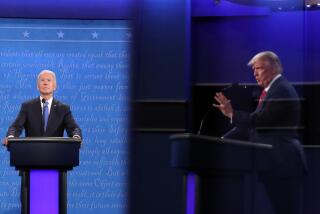COLUMN LEFT / ALEXANDER COCKBURN : Clinton Opens His Arms to the Bankers : After talking of economic change, he succumbs to austerity-mongers.
- Share via
The politics of Peru and the United States aren’t really so different in certain fundamental respects. Comparing the two is a useful way of fixing on the basic issues in the presidential race now under way in the United States.
A couple of years ago, Alberto Fujimori ran for the presidency of Peru, presenting himself as the alternative to Mario Vargas Llosa, a candidate calling for slash-and-burn austerity measures as demanded by the International Monetary Fund. These measures would be imposed, Fujimori charged, by a small, white, wealthy Peruvian elite, on the backs of the poor.
Peru’s discontented voters voted him in. But his presidency was less than a week old before Fujimori betrayed the central promise of his campaign.
He summoned austerity-mongers like the Harvard economist Jeffrey Sachs, the man whose crash “free market” program had reduced the Bolivian and Polish economies to rubble. The IMF and the bankers hailed Fujimori’s wise leadership forthwith. Peru’s poor sank deeper into despair and, unsurprisingly, the guerrilla movement known as the Shining Path, with its call for economic and social revolution, flourished. Peru’s economy continues to be a catastrophe, which the recent capture of Shining Path’s leader, Abimael Guzman, will do nothing to alleviate.
As with Peru two years ago, we now have an election with a candidate promising fundamental reform and an end to the policies of inequality and stagnation. The polls show that these pledges are finding an eager audience. Bill Clinton is ahead because, in peoples’ minds, he stands for economic change.
Fujimori betrayed his supporters because he hadn’t the courage to buck the elite IMF consensus. His surrender was understandable. Consensus, particularly when it is being urged by bankers and economists of eminence and distinction, is a compelling embrace.
Such consensus, operating on the same premises as it did in Peru, is even now threatening to destroy Clinton’s presidency, along with all pledges of change, before the voters have even gone to the polls.
The consensus being fostered by the U.S. elites is that the core economic crisis is the deficit and the solution is a balanced budget, to be achieved by raising taxes and cutting services. The pain prescription is a familiar one: taxes on gas, on Social Security, on Medicaid; cuts in services.
As with most so-called “consensus,” this particular one is engineered by the simple expedient of ignoring everyone outside it. Listen to an economist and Nobel prize-winner of immense distinction, Prof. James Tobin of Yale:
“People talk about deficit reduction as though it’s an end in itself,” Tobin told the Wall Street Journal last week. He forthwith stressed that it is not, and that “we need a short-run fiscal expansionary policy to get out of the slough of despond we are in now.” As for the deficit, he said, deal with it later.
There’s nothing very startling in Tobin’s view, but such is the power of neo-liberal consensus-mongering that in the current political atmosphere, calls for fiscal expansion are treated as akin to Bolshevism.
On the economy and on health care, perhaps the two major concerns of Americans this fall, there is every sign that Clinton has succumbed to consensus thinking, as formulated by Wall Street bankers and their academic entourage.
After a brief flurry of concern that “radicals” might have infiltrated Clinton’s camp, the word has gone forth: Clinton’s team is headed by sure-handed, level-headed Wall Streeters (junk bond traders, actually) like Roger Altman, to whom the deficit issue is central.
Clinton himself let slip his austere outlook in a recent interview in Rolling Stone. “We are going to have to reconcile ourselves not to being a hard-work, low-wage country but to having a higher percentage of people at lower wage levels.” (Apparently this circuitous expression of the business agenda was not clear enough for Rolling Stone’s William Greider, who then asked the governor of Arkansas, “Which side are you really on?”).
As for health care, Clinton’s most fathomable policy statement is that he is not for the Canadian single-payer system, which is denounced by the consensus as cruel to insurance companies and doctors.
Next year, like Peruvians in the aftermath of 1990, Americans will--unless Clinton celebrates victory by firing his current set of economic advisers--ask themselves what happened to all the talk about fundamental change. And America hasn’t even got a Shining Path movement to concentrate his mind.
More to Read
Sign up for Essential California
The most important California stories and recommendations in your inbox every morning.
You may occasionally receive promotional content from the Los Angeles Times.










